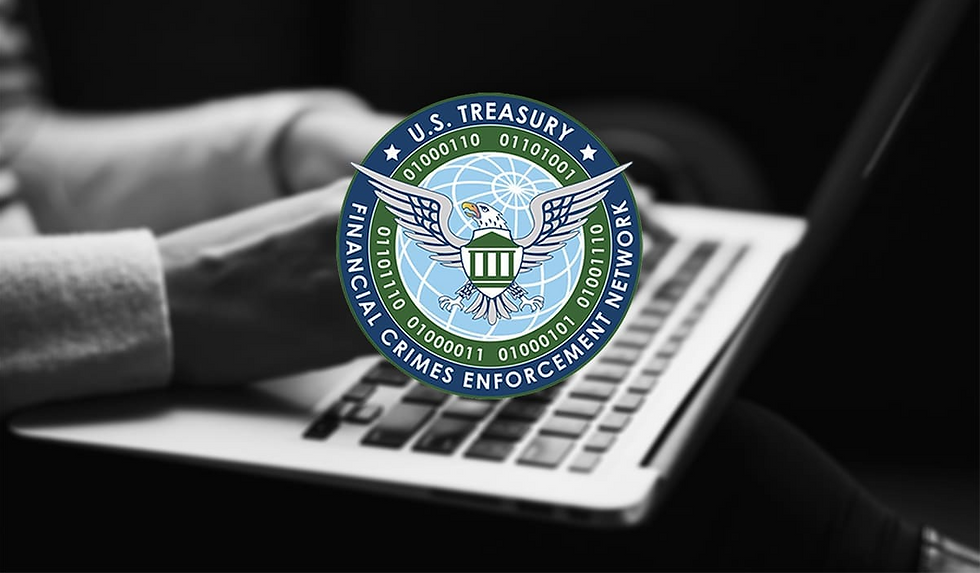FinCEN Guidance on Cross-Border Information Sharing Bolsters Global AML Efforts
- Flexi Group
- Sep 10, 2025
- 4 min read
The U.S. Financial Crimes Enforcement Network (FinCEN) has issued new guidance on cross-border information sharing, marking a significant advance in the global fight against money laundering.

At the heart of the move lies a recognition of a long-standing vulnerability: criminals thrive when oversight is fragmented, exploiting gaps between national regulatory systems. By clarifying how financial institutions may exchange information without violating the Bank Secrecy Act’s (BSA) strict confidentiality rules, FinCEN has eliminated a gray area that has long allowed illicit actors to move undetected.
Cooperation and Cross-Border Frameworks
While the prohibition on directly disclosing Suspicious Activity Reports (SARs) remains intact, FinCEN emphasized that the factual material underpinning those reports—such as transaction data, customer details, and investigative insights—may be voluntarily shared across borders. This creates new opportunities for banks, securities firms, casinos, insurance providers, and other covered institutions to construct a more complete picture of financial crime patterns.
The directive aligns with the repeated calls of international organizations, which have described information sharing as the “backbone” of anti-money laundering (AML) and counter-terrorist financing systems. It also extends the protections already granted under Section 314(b) of the USA PATRIOT Act, which provides safe harbor for domestic information exchange under certain conditions. With this new guidance, institutions can now apply similar practices to foreign affiliates and trusted partners, backed by clear regulatory assurances.
FinCEN’s clarification allows compliance departments to integrate resources more effectively, coordinate investigations across borders, and refine their ability to detect typologies that cut across jurisdictions.
Exploiting Cross-Border Blind Spots
For decades, organized crime syndicates, terrorist financiers, and professional money launderers have capitalized on the lack of seamless cross-border cooperation. Modern laundering schemes—ranging from trade-based manipulation to complex layering of digital assets—are designed to flourish in siloed environments.
Consider a U.S. bank observing large sums flowing offshore through a correspondent relationship. While it may recognize the volume, it often lacks insight into the foreign account holder’s identity or activity. Conversely, the overseas institution may see the incoming transfers but have no knowledge of the suspicious domestic origins.
This lack of transparency creates ideal conditions for layering, enabling illicit proceeds to hop between multiple jurisdictions in quick succession, obscuring their trail. Trade-based laundering, in particular, relies on misinvoicing, fabricated documentation, and shell intermediaries—discrepancies that can only be detected when institutions share data across borders.
The guidance also draws attention to the vulnerabilities posed by digital assets. As cryptocurrency adoption expands, criminals exploit regulatory loopholes. Exchanges based in permissive jurisdictions are often used to convert cash into tokens, while stricter jurisdictions may flag unusual fiat off-ramps without being able to trace the origin of the funds. With robust cross-border sharing, institutions can “close the loop” on such schemes.
Global scandals have repeatedly demonstrated how fragmented oversight weakens defenses—from correspondent accounts infiltrated by drug cartels to Russian funds flowing through Baltic banks, to offshore networks linked to kleptocrats. FinCEN’s directive aims to directly address these weak points by empowering institutions to connect the dots earlier, before law enforcement is forced into a reactive stance.
SAR Confidentiality and Compliance Boundaries
A key element of the directive is its clarification on SAR confidentiality. FinCEN reiterated that while the SARs themselves remain protected from disclosure, the factual details supporting them may be shared. This distinction is critical, as SARs contain sensitive information about investigative methods and institutional priorities. Their confidentiality prevents “tipping off” customers and protects the integrity of ongoing inquiries.
However, transaction histories, beneficial ownership records, customer identifiers, and even internal monitoring alerts are not automatically treated as SARs. By authorizing their exchange across borders, FinCEN provides compliance teams with the tools to collaborate more effectively without fear of regulatory violation. An alert raised in one jurisdiction can now be contextualized with intelligence from another, significantly strengthening internal risk assessments.
Institutions must still observe broader legal obligations, including privacy requirements under the Gramm-Leach-Bliley Act and the Right to Financial Privacy Act, as well as foreign data protection laws. This means compliance teams must weigh the benefits of sharing against privacy obligations, conducting careful, case-specific reviews before transmitting information abroad.
The broader aim is to encourage “intelligent” sharing, not reckless disclosure—emphasizing accuracy, confidentiality, and operational effectiveness.
Strategic Implications for Global Enforcement
The ripple effects of FinCEN’s move extend well beyond U.S. borders. The guidance sets a precedent that could inspire foreign regulators to adopt similar measures, laying the groundwork for a more harmonized international compliance framework. For multinational financial groups, this creates the opportunity to standardize information-sharing protocols across affiliates, reducing duplication and accelerating investigations.
Law enforcement agencies stand to gain exponentially. A larger, more detailed pool of intelligence from financial institutions translates into more actionable reports. Agencies pursuing drug traffickers or terrorist financiers benefit when banks have already exchanged contextual intelligence, narrowing investigative targets before formal subpoenas or warrants are issued.
The guidance also addresses emerging vulnerabilities in the digital finance sector. As decentralized finance platforms and peer-to-peer exchanges evolve, criminals increasingly attempt to exploit regulatory arbitrage. By fostering cooperation between traditional financial institutions and those in the digital asset space, cross-border sharing closes a critical loophole.
From a policy perspective, the directive underscores a fundamental truth: financial crime is inherently transnational, and defenses must mirror that reality. The effectiveness of AML systems depends less on isolated national regimes than on their ability to operate as a connected global web. By broadening the scope for voluntary collaboration, FinCEN is pushing financial institutions closer to that goal.
By fLEXI tEAM





Comments